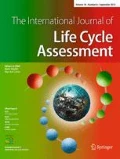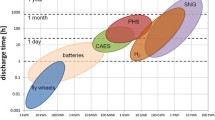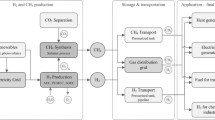Abstract
Purpose
Technologies with low environmental impacts and promoting renewable energy sources are required to meet the energetic demand while facing the increase of gas emissions associated to the greenhouse effect and the depletion of fossil fuels. CO2 methanation activated by magnetic heating has recently been reported as a highly efficient and innovative power-to-gas technology in a perspective of successful renewable energy storage and carbon dioxide valorisation. In this work, the life cycle assessment (LCA) of this process is performed, in order to highlight the environmental potential of the technology, and its competitivity with in respect to conventional heating technologies.
Methods
The IMPACT 2002+ was used for this LCA. The process studied integrates methanation, water electrolysis and CO2 capture and separation. This “cradle-to-gate” LCA study does not consider the use of methane, which is the reaction product. The functional unit used is the energy content of the produced CH4. The LCA was carried out using the energy mix data for the years 2020 and 2050 as given by the French Agency for Environment and Energy management (ADEME). Consumption data were either collected from literature or obtained from the LPCNO measurements as discussed by Marbaix (2019). The environmental impact of the CO2 methanation activated by magnetic heating was compared with the environmental impact of a power-to-gas plant using conventional heating (Helmeth) and considering the environmental impact of the natural gas extraction.
Results
It is shown that the total flow rate of reactants, the source of CO2 and the energy mix play a major role on the environmental impact of sustainable CH4 production, whereas the lifetime of the considered catalyst has no significant influence. As a result of the possible improvements on the above-mentioned parameters, the whole process is expected to reduce by 75% in its environmental impact toward 2050. This illustrates the high environmental potential of the methanation activated by magnetic heating when coupled with industrial exhausts and renewable electricity production.
Conclusions
The technology is expected to be environmentally competitive compared with existing similar processes using external heating sources with the additional interest of being extremely dynamic in response, in line with the intermittency of renewable energy production.







Similar content being viewed by others
References
ADEME (2018) Trajectoires d’évolution du mix électrique 2020-2060, synthèse de l’étude
Arvidsson R, Svanström M (2016) A framework for energy use indicators and their reporting in life cycle assessment. Integr Environ Assess Manag 12:429–436. https://doi.org/10.1002/ieam.1735
Bailera M, Lisbona P, Romeo LM, Espatolero S (2017) Power to gas projects review: lab, pilot and demo plants for storing renewable energy and CO 2. Renew Sust Energ Rev 69:292–312. https://doi.org/10.1016/j.rser.2016.11.130
Bare JC, Hofstetter P, Pennington DW, de Haes HAU (2000) Midpoints versus endpoints: the sacrifices and benefits. Int J Life Cycle Assess 5:319–326. https://doi.org/10.1007/BF02978665
Bordet A, Lacroix LM, Fazzini PF et al (2016) Magnetically induced continuous CO2 hydrogenation using composite iron carbide nanoparticles of exceptionally high heating power. Angew Chemie Int Ed 55:15894–15898. https://doi.org/10.1002/anie.201609477
Bui M, Adjiman CS, Bardow A et al (2018) Carbon capture and storage (CCS): the way forward. Energy Environ Sci 11:1062–1176. https://doi.org/10.1039/c7ee02342a
Buttler A, Spliethoff H (2018) Current status of water electrolysis for energy storage, grid balancing and sector coupling via power-to-gas and power-to-liquids: a review. Renew Sust Energ Rev 82:2440–2454. https://doi.org/10.1016/j.rser.2017.09.003
Chevalier B, Reyes-carrillo T, Laratte B (2011) Methodology for choosing life cycle impact assessment sector-specific indicators
Collet P, Flottes E, Favre A et al (2017) Techno-economic and life cycle assessment of methane production via biogas upgrading and power to gas technology. Appl Energy 192:282–295. https://doi.org/10.1016/j.apenergy.2016.08.181
Cuéllar-Franca RM, Azapagic A (2015) Carbon capture, storage and utilisation technologies: a critical analysis and comparison of their life cycle environmental impacts. J CO2 Util 9:82–102. https://doi.org/10.1016/j.jcou.2014.12.001
Fasihi M, Efimova O, Breyer C (2019) Techno-economic assessment of CO2 direct air capture plants. J Clean Prod. https://doi.org/10.1016/j.jclepro.2019.03.086
Gale J, Metz B, Davidson O, de Coninck H, Loos M, Meyer L (eds) (2005) Carbon dioxide capture and storage. Intergovernmental Panel on Climate Change. Cambridge University Press, New York, pp 75–104
Götz M, Lefebvre J, Mörs F et al (2016) Renewable power-to-gas: a technological and economic review. Renew Energy 85:1371–1390. https://doi.org/10.1016/j.renene.2015.07.066
Gruber M, Weinbrecht P, Biffar L et al (2018) Power-to-gas through thermal integration of high-temperature steam electrolysis and carbon dioxide methanation - experimental results. Fuel Process Technol 181:61–74. https://doi.org/10.1016/j.fuproc.2018.09.003
Hansen JB (2015) Solid oxide electrolysis - a key enabling technology for sustainable energy scenarios. Faraday Discuss 182:9–48. https://doi.org/10.1039/c5fd90071a
Hergt R, Dutz S, Müller R, Zeisberger M (2006) Magnetic particle hyperthermia: nanoparticle magnetism and materials development for cancer therapy. J Phys Condens Matter 18:S2919–S2934. https://doi.org/10.1088/0953-8984/18/38/S26
Hervault A, Thanh NTK (2014) Magnetic nanoparticle-based therapeutic agents for thermo-chemotherapy treatment of cancer. Nanoscale 6:11553–11573. https://doi.org/10.1039/C4NR03482A
Jolliet O, Margni M, Charles R et al (2003) IMPACT 2002+: a new life cycle impact assessment methodology. Int J Life Cycle Assess 8:324–330. https://doi.org/10.1007/BF02978505
Leung DYC, Caramanna G, Maroto-Valer MM (2014) An overview of current status of carbon dioxide capture and storage technologies. Renew Sust Energ Rev 39:426–443. https://doi.org/10.1016/j.rser.2014.07.093
Marbaix J (2019) Etude multi-échelle de l’activation de réactions catalytiques par chauffage magnétique pour le stockage des énergies renouvelables PhD dissertation, Université de Toulouse
Markewitz P, Kuckshinrichs W, Leitner W et al (2012) Worldwide innovations in the development of carbon capture technologies and the utilization of CO2. Energy Environ Sci 5:7281. https://doi.org/10.1039/c2ee03403d
Meffre A, Mehdaoui B, Connord V, Carrey J, Fazzini PF, Lachaize S, Respaud M, Chaudret B (2015) Complex nano-objects displaying both magnetic and catalytic properties: a proof of concept for magnetically induced heterogeneous catalysis. Nano Lett 15:3241–3248. https://doi.org/10.1021/acs.nanolett.5b00446
Meylan FD, Moreau V, Erkman S (2016) Material constraints related to storage of future European renewable electricity surpluses with CO2 methanation. Energy Policy 94:366–376. https://doi.org/10.1016/j.enpol.2016.04.012
Mortensen PM, Engbæk JS, Vendelbo SB et al (2017) Direct hysteresis heating of catalytically active Ni-Co nanoparticles as steam reforming catalyst. Ind Eng Chem Res 56:14006–14013. https://doi.org/10.1021/acs.iecr.7b02331
National Technical University of Athens, Sunfire, Karlsruhe Institute of Technology (2017) Helmeth, Deliverable 5.2, Final LCA Report
Pérez-Camacho MN, Abu-Dahrieh J, Rooney D, Sun K (2015) Biogas reforming using renewable wind energy and induction heating. Catal Today 242:129–138. https://doi.org/10.1016/j.cattod.2014.06.010
Peterson D, Miller E (2016) Hydrogen and fuel cells program record - hydrogen production cost from solid oxide electrolysis. In: US Department of Energy, pp 1–11
Reiter G, Lindorfer J (2015) Global warming potential of hydrogen and methane production from renewable electricity via power-to-gas technology. Int J Life Cycle Assess 20:477–489. https://doi.org/10.1007/s11367-015-0848-0
Rochelle GT (2009) Amine scrubbing for CO2 capture. Science 325:1652–1654. https://doi.org/10.1126/science.1176731
Rochelle GT (2016) Conventional amine scrubbing for CO2 capture. In: Absorption-based post-combustion capture of carbon dioxide. Elsevier, pp 35–67
Salunkhe AB, Khot VM, Pawar SH (2014) Magnetic hyperthermia with magnetic nanoparticles: a status review. Curr Top Med Chem 14:572–594. https://doi.org/10.2174/1568026614666140118203550
Socolow R, Desmond M, Aines R, Blackstock J (2011) Direct air capture of CO2 with chemicals. In: Direct air capture of co2 with chemicals. APS Physics
Varsano F, Bellusci M, La Barbera A et al (2019) Dry reforming of methane powered by magnetic induction. Int J Hydrog Energy. https://doi.org/10.1016/j.ijhydene.2019.02.055
Vilches Arenas LF, Alonso-Fariñas B, Navarrete B et al (2018) Carbon capture and utilization technologies: a literature review and recent advances. Energy Sour Part A 41:1403–1433. https://doi.org/10.1080/15567036.2018.1548518
Vinum MG, Almind MR, Engbaek JS et al (2018) Dual-function cobalt-nickel nanoparticles tailored for high-temperature induction-heated steam methane reforming. Angew Chemie Int Ed 57:10569–10573. https://doi.org/10.1002/anie.201804832
Wang W, Duong-Viet C, Xu Z et al (2019) CO2 methanation under dynamic operational mode using nickel nanoparticles decorated carbon felt (Ni/OCF) combined with inductive heating. Catal Today. https://doi.org/10.1016/j.cattod.2019.02.050
Funding
This project has received funding from the European Research Council (ERC) under the European Union’s Horizon 2020 research and innovation programme (grant agreement no. [694159] MONACAT). This work has also been supported by Toulouse Tech Transfer (http://www.toulouse-tech-transfer.com) for valorisation and transfer.
Author information
Authors and Affiliations
Corresponding author
Additional information
Communicated by Shabbir Gheewala
Publisher’s note
Springer Nature remains neutral with regard to jurisdictional claims in published maps and institutional affiliations.
Rights and permissions
About this article
Cite this article
Marbaix, J., Kerroux, P., Montastruc, L. et al. CO2 methanation activated by magnetic heating: life cycle assessment and perspectives for successful renewable energy storage. Int J Life Cycle Assess 25, 733–743 (2020). https://doi.org/10.1007/s11367-020-01734-8
Received:
Accepted:
Published:
Issue Date:
DOI: https://doi.org/10.1007/s11367-020-01734-8




